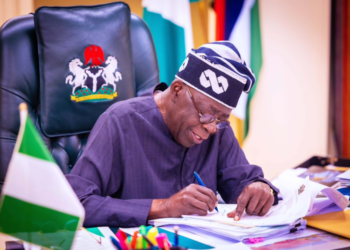Over the years, the Nigerian economy has had to battle with threats arising from its macroeconomic indicators and affecting the naira value. These threats includes the high inflationary pressure, the Balance of trade deficit, depletion of the foreign reserves among others, exerting pressure on the naira exchange rate. The Central Bank of Nigeria (CBN) has therefore implemented certain policies that have intended to strengthen the naira.
Since the novel outbreak of the COVID-19 pandemic in 2020 and its global effect, the monetary authority have been churning out a combination of policies to deal with its impact in Nigeria with respect to exchange rate of the naira to dollar.
- Devaluation of the Naira
The CBN embarked on a devaluation policy in 2020 following the economic shutdown, supply chain disruptions, dwindling forex reserves and the deteriorating exchange rate of the Naira against major currencies of the globe where the official exchange rate was put at around $410/$1. Apparently, this was expected to increase foreign investment inflows into the economy and increase foreign reserves into the economy. However, with this rate, the local currency has faced enormous pressure such that the parallel and black markets rate are fast inching towards $590/$1: meaning that, with one thousand naira, you can only get a US dollar.
- Ban of DMBs, NBFIs and OFIs trade of crypto currency
The CBN directed Deposit Money Banks (DMBs), non-bank financial institutions (NBFIs), and other financial institutions (OFIs) to identify persons or entities involved in cryptocurrency transactions within their systems and ensure that such accounts are closed immediately in February, 2021. This policy was acclaimed to stop scams, money laundering, terrorism financing, illicit fund flows and other criminal offences since the Central Bank claimed that the platform aided these vices.
However, this action by the CBN raised controversy concerns across experts, operators and speculators on the negative effect it could have on the country’s growing cryptocurrency market and innovation in financial technology (fintech).
- “Naira 4 Dollar Scheme”
In March 2021, the CBN introduced the “Naira 4 Dollar Scheme” as an incentive to boost inflows of forex remittances from diaspora into the country. With this initiative, it meant all recipients of diaspora through CBN’s licensed international money transfer operators (IMTOs) are paid N5 for every $1 received as remittance inflow. That is, if you receive a diaspora remittance of $5,000 (Five Thousand Dollars) CBN would simply credit your account with an additional N25,000 (N5*$5,000)
Many market analysts applauded this scheme as a great approach to drive foreign exchange inflow into the country.
- The adoption of the NAFEX rate as the exchange rate benchmark rate
In May, 2021, the CBN adopted the NAFEX rate as the benchmark rate to avoid the multiple official rates in the country (i.e. the CBN rate and the IEFX rate) .
Debatably, one benefit of this action was that it reduced the FX subsidy by at least 7.5% i.e. from N410/$1 (IEFX rates) to N379/$1 (CBN rates).
- Ban of Forex sale to BDCs
In July, 2021, the CBN introduced the ban on the sale of foreign exchange (forex) to Bureau De Change (BDC) operators as it stopped the issuance of new licenses to BDCs. This was in a bid to reduce the margin between the official rates and the parallel rates in the market. This was aimed at reducing the rate of money laundering in Nigeria since these BDCs help in illegal financial outflows of the dollar. The CBN governor also alleged that the BDCs were contributing to the unsupported demand for the foreign currencies.
However, this policy has only led to a further depreciation of the naira against the dollar. Apparently, a day after the policy was enacted, the naira fell from N505/$1 to N525 /$1 at the parallel market and today, the naira is trading at a record-high rate of between N578/$1 to N583/$1 at the black market, leaving the official exchange rate at N416.67/$1.
- Freezing of accounts that belonged to some technology trading platforms
August 2021 saw another light of a policy implementation as the CBN was granted the request to freeze accounts belonging to some technology trading platforms offering local and foreign stocks. The Apex bank stated that it conducted an investigation on “illegal foreign exchange trading” by the fintech companies and thereby sought the court injunction to freeze their accounts for 180 days pending the completion of investigations. The companies included Rise Vest Technologies, Bamboo Syatems Technology Limited, Bamboo Systems Technology OPNS, Chaka Technlogies Limited, CTL/Business Expenses and Trove Technologies Limited.
However, in this month, the naira depreciated to as high as N530/$1 in the parallel market while the volume of dollars traded (turnover) in the Investors and Exporters (I&E) window of the Nigerian foreign exchange market rose by 17 percent, month on month from $2.75 billion in July, 2021 to $3.22 billion in August.
Following the completion of the CBN’s investigation, the CBN alleged that Rise Vest Technologies, Bamboo Systems Technology Limited and Trove Technologies Limited were complicit in operating without license as asset management companies. Although, utilized FX sourced from the Nigerian FX market to purchase foreign bonds/shares in violation of the CBN circular dated July 01, 2015 with the reference number; “TED/FEM/FPC/GEN/01/012.
However, the companies assured the customers of the safety of their funds and affirmed their willingness to work with the CBN to address the illegitimacy concerns.
- The Launch of Africa’s first digital currency – The e-Naira
In October 2021, the Central Bank of Nigeria introduced the country’s first digital currency, the e-Naira as a medium of exchange and a store of value in offering payments across retail transactions. The CBN partnered with a Barbados-based company, Bitt Inc. to launch the digital currency operations in a bid to offer cheap, efficient and faster payment means for most Nigerians.
The CBN also explained that the e-Naira would drive financial inclusion, strengthen the electronic payment in the country and enhance movement of people from the informal to the formal sector. Also, at launch of the digital currency, the President of Nigeria, Muhammadu Buhari said the currency has the capacity to increase the country’s Gross Domestic Product by $29bn dollars over the next 10 years.
The App saw over 600,000 downloads in less than four weeks after it was launched according to the CBN Governor, Emefiele. And, to effectively optimize the functionality of this initiative, there is a need for African nations to interact using the e-Naira. Hence the need for the pan-African clearing system.
In January 2022, the pan African payment and settlement system had its operational launch intended to reduce the dependencies on foreign currencies and to boost intra-African trade.
- RT200 Policy: CBN to pay N65 for every $1 repatriated and sold at the I&E window.
The CBN introduced the RT200 programme as an avenue to reduce the exposure of foreign exchange to unstable sources and t earn more stable and sustainable Foreign exchange inflows. Hence, this programme is designed to encourage exporters in the non-oil sector to repatriate and sell export proceeds in the FX Market.
Furthermore, the apex bank acclaimed to pay N35 for every $1 repatriated and sold at the I&E window for personal use on eligible transactions only. However, the CBN stated that the incentives will be paid on quarterly basis, any exporter who presents fake documents or tries to undermine the scheme will be banned from accessing the incentives in 24 months, and all the accounts of such a person will be blocked.
In 2007, the CBN announced the 4-point agenda designed to make the Naira the “Reference Currency in Africa” as part of its Financial System Strategy 2020. This policy included aspects of: Currency Re-Denomination, Inflation stability, Forex liquidity and stability management and, current account liberalization and accession based on the Article VII of the IMF. The policy aim was further divided into subsets to include; strengthened public confidence in the naira, promoting the availability of cleaner notes, easier convertibility of the Naira to enhance the inflow of foreign investment.
Conclusion
The CBN’S consistent effort to attract foreign inflows and strengthen the naira exchange rate are applauded and very welcome. However, the monetary policies alone cannot be deal with the insufficient foreign currencies supplies in the economy.
Hence, the CBN realized this, and acknowledged it in its Communique resulting from the MPC meeting on the 24th and 25th January 2022. Regardless, the CBN identified other factors that could complement its effort and stated that till these factors or variables are in right standing, it will continue to attempt the management of the FX dilemma by using various incentives in the economy.








